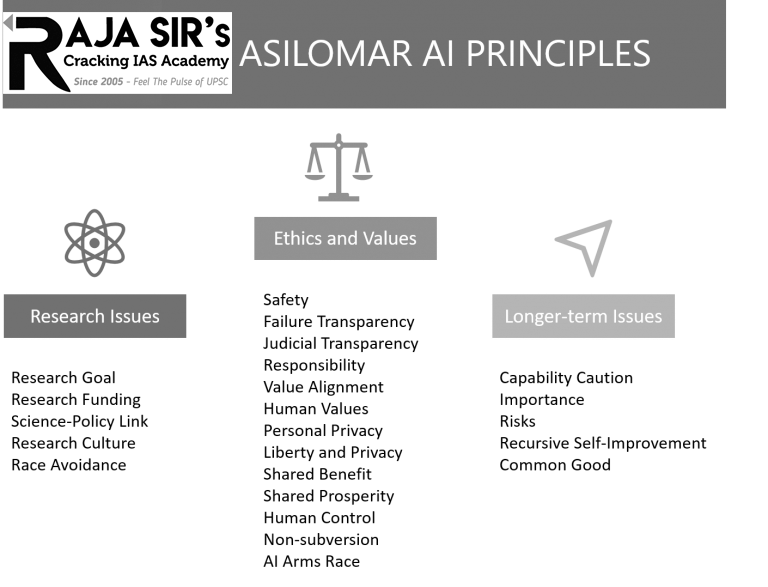- Home
- Prelims
- Mains
- Current Affairs
- Study Materials
- Test Series
UNESCO - global standard for AI ethics.
Artificial intelligence (AI) is more present in human lives than ever. AI algorithms can also be partially credited for the rapidity with which vaccines were developed to tackle COVID-19. The algorithms crunched complex data from clinical trials being undertaken in all corners of the world, creating global collaborations that could not have been imagined even a decade ago. But the AI has also posed several challenges in the present scenario.
Challenges associated with AI
- The data used to feed into AI often aren''t representative of the diversity of societies, producing outcomes that can be said to be biased or discriminatory.
- Example: While India and China together constitute approximately a third of the world’s population, Google Brain estimated that they form just 3% of images used in ImageNet, a widely used dataset.
- Problems are emerging in facial recognition technologies also.
- These are used to access phones, bank accounts, and apartments, and are employed by law-enforcement authorities, in identifying women and darker-skinned people.
- In the programs released by major technology companies related to facial recognition, the error rate was 1% for light-skinned men, but 19% for dark-skinned men, and up to 35% for dark-skinned women.
- Biases in facial recognition technologies have led to wrongful arrests.
AI and India
- India is one of the world’s largest markets for AI-related technologies, valued at over $7.8 billion in 2021.
- The National Strategy on Artificial Intelligence released by NITI Aayog in 2018 highlights the potential of AI in solving complex social challenges faced by Indian citizens in agriculture, health, and education.
- To ensure that the full potential of these technologies is reached, the right incentives for ethical AI governance need to be established in national and sub-national policy.
- India has made great strides in the development of responsible and ethical AI governance, starting with NITI Aayog’s #AIForAll campaign to the many corporate strategies that have been adopted to ensure that AI is developed with common, humanistic values.
World’s approach toward AI
- In November 2021, 193 countries reached a groundbreaking agreement at UNESCO on “Ethics of Artificial Intelligence”.
- It talks about how AI should be designed and used by governments and tech companies.
UNESCO’s recommendation
UNESCO’s Recommendation on the Ethics of Artificial Intelligence aims to fundamentally shift the balance of power between people, and the businesses and governments developing AI.
Affirmative actions
- Countries that are members of UNESCO have agreed to implement the recommendations by enacting actions to regulate the entire AI system life cycle, ranging from research, design, and development to deployment and use.
- This means they must use affirmative action to make sure that women and minority groups are fairly represented on AI design teams.
- This could take the form of quota systems that ensure that these teams are diverse or the form of dedicated funds from their public budgets to support such inclusion programs.
Proper management of data
- The recommendation also underscores the importance of the proper management of data, privacy, and access to information.
- It establishes the need to keep control over data in the hands of users, allowing them to access and delete the information as needed.
- It also calls on member states to ensure that appropriate safeguards schemes are devised for the processing of sensitive data and that effective accountability and redress mechanisms are provided in the event of harm.
Socio-cultural impacts of AI
- AI systems should not be used for social scoring or mass surveillance purposes.
- Particular attention must be paid to the psychological and cognitive impact that these systems can have on children and young people.
- Member states should invest in and promote not only digital, media, and information literacy skills, but also socio-emotional and AI ethics skills to strengthen critical thinking and competencies in the digital era.
- This is all critical for ensuring accountability and transparency of AI-related technologies, underpinning a strong rule of law that adapts to new digital frontiers.
Application of Recommendation
- In a number of countries, the principles of the Recommendation are already being used in AI regulation and policy, demonstrating their practical viability.
- Finland provides an example of good practice in this regard, with its 2017 AI Strategy.
- This was the first of its kind in any European country and demonstrated that governments can effectively promote ethical AI use without compromising the desire to be on the cutting edge of new technologies.
Road Ahead
- The new agreement is a recognition that AI-related technologies cannot continue to operate without a common rulebook.
- Over the coming years, the recommendation will serve as a compass to guide governments and companies, to voluntarily develop and deploy AI technologies that conform with the commonly agreed principles it establishes.
- Governments should use the recommendation to establish and update legislation, regulatory frameworks, and policy to embed humanistic principles in enforceable accountability mechanisms.
With this agreement, it can be assumed that AI to work where it can have the most impact: hunger, environmental crises, inequalities, and pandemics. If all the recommendation is followed, AI has the potential to solve the current prevailing problems.









 Latest News
Latest News

 General Studies
General Studies